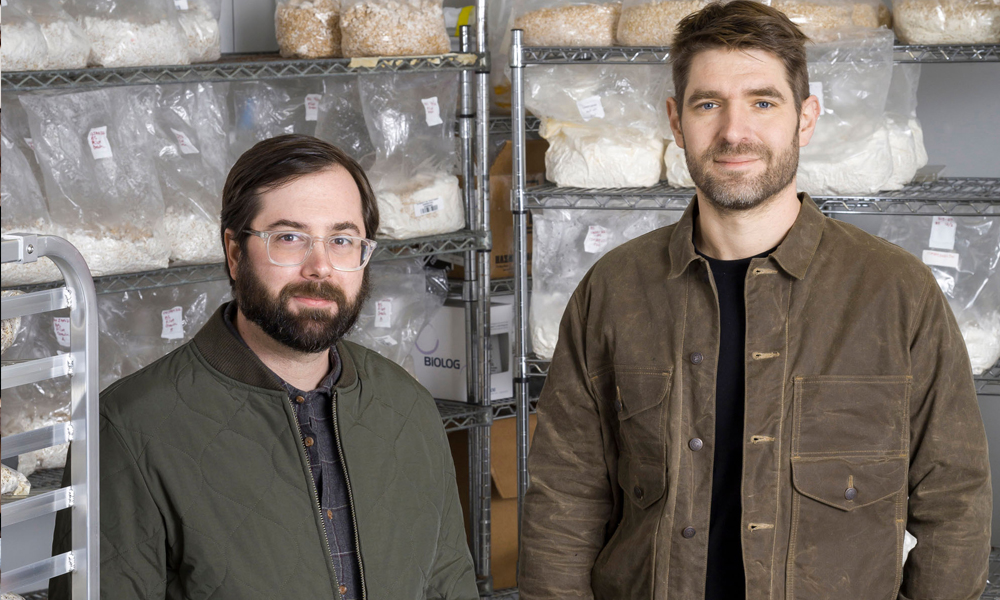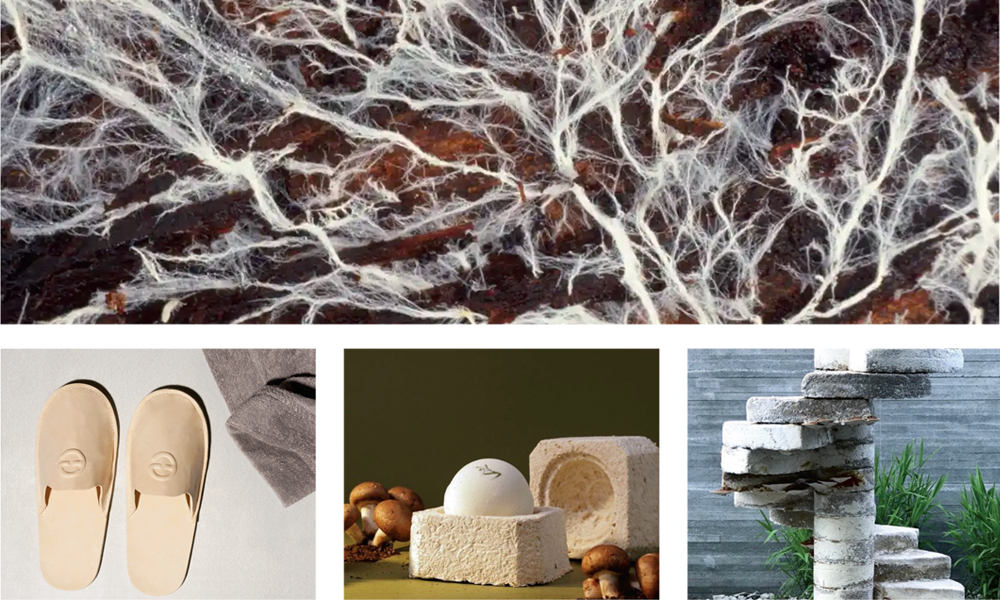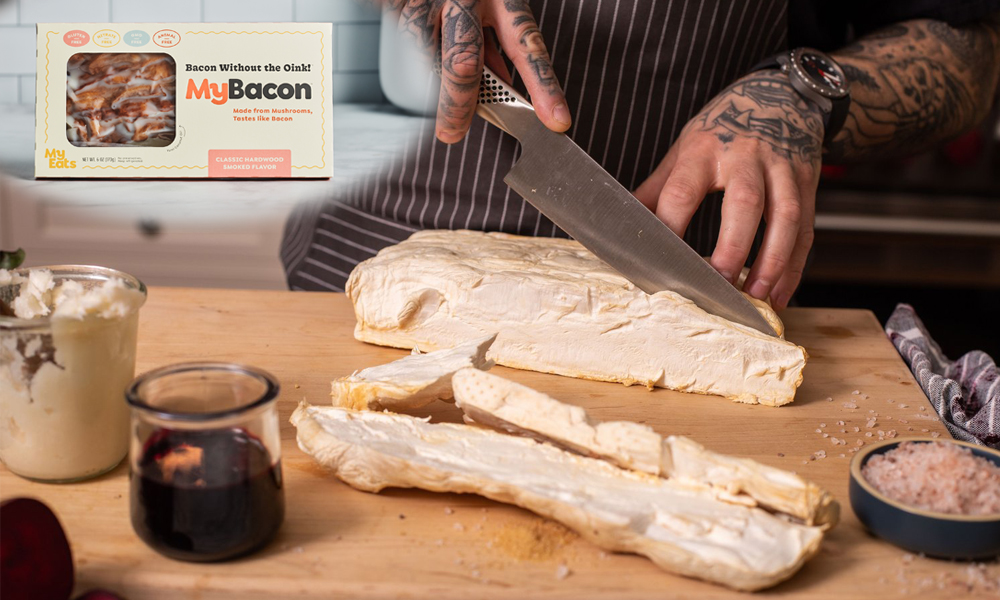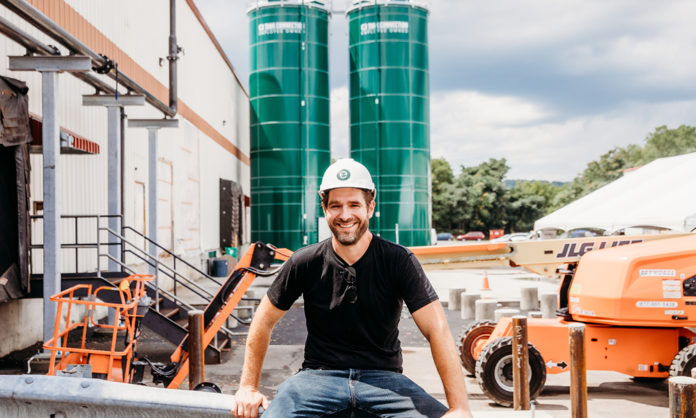The story of how Eben Bayer created a brand-new field of science, built two companies that are at the forefront of bioengineering technology, and forced the packaging, beauty, fashion and food industries to rethink the way things have always been done—all in just 15 years’ time—begins on a farm.
“I was literally born on the floor of a farmhouse,” says Bayer, a native Vermonter. “I cut my teeth raising pigs, chickens and cows and making maple syrup on a real working farm.” One of his chores was to load waste wood chips into a wood gas generator, a job made more difficult by mycelium, a naturally occurring, filamentous fungal web that caused the wood chips to clump together. “It was a giant annoyance to me as a kid because it slowed me down,” Bayer says. “But I was also like, ‘Wow, this stuff is really strong and interesting,’ and it sort of went into the back of my head.”
Mycelium, which is often described as the root structure of mushrooms, stayed in the back of Bayer’s head until 2006, when he took an “Inventor’s Studio” course with Professor Burt Swersey at RPI. “Burt was really pushing me to invent something meaningful,” Bayer says. “Some of the problems I was working on were how to make a better insulator, and how to bind materials together not using a plastic glue, plastic foam or formaldehyde. How would you make an insulation that was structural and not made out of plastic?” The answer: mycelium.

Bayer grew his first palm-sized puck of mycelium material under the bed in his dorm room. He showed it to Professor Swersey, who encouraged his student to pursue the idea and take his course again the following semester with classmate Gavin McIntyre. “Burt’s belief was that inventions come from individuals, but it takes teams to commercialize them,” Bayer says. “So Gavin and I became a team.”
That was the beginning of Ecovative, an eco-friendly materials company founded in Green Island that recently celebrated the grand opening of Swersey Silos, which will store feedstock for the world’s largest mycelium farm. After first considering the practicality of mycelium as an insulation and construction material, CEO Bayer and CCO McIntyre turned their attention to the packaging industry, where Styrofoam, which takes some 450 years to decompose, was the norm. Using the power of mycelium and a bit of feedstock (agricultural waste such as hemp hurd, seed hulls and corn husks, or forestry byproducts like sawdust and woodchips), Bayer and McIntyre were able to literally grow MycoComposite, a light, durable, fire- and water-resistant, fully compostable Styrofoam alternative, into any shape they wanted. (In 2013, they grew a tiny house, and a few years later launched grow-it-yourself kits so anyone can wield the power of mycelium.) In 2011, Ecovative partnered with Dell (yes, MycoComposite is strong enough to protect precious cargo like laptops), and several years later collaborated with IKEA. Today, if you order items such as Keap Candles, Treaty CBD extracts and Loli skincare products, they’ll arrive at your doorstep in mushroom packaging.

To put this development into perspective, no one else was doing anything remotely like it at the time. “We actually created the field of mycelium material science,” Bayer says. “We were able to get super-broad patents because of that in our early days. And now it has become a real field. Universities around the world have people doing research on mycelium.”
But even before the rest of the world could catch up, Bayer and McIntyre made another groundbreaking discovery: They figured out how to grow materials made purely of mycelium—no feedstock mixed in. Typically mycelium grows around the substrate (an underlying substance, such as feedstock), producing a reinforced, hard material. The new discovery allowed them to grow mycelium above the substrate, producing large sheets of squishy, mushroom-y material they called AirMycelium. Since then, Ecovative has used AirMycelium technology to create high-performance foam, beauty products, leather and, perhaps most notably, food.
In 2020, Bayer and McIntyre founded the company now known as MyForest Foods. Its flagship product: mycelium bacon, a.k.a. MyBacon. “Bacon is the No. 1 food that meat-eaters say they can’t give up,” Bayer said this past July at the Swersey Silos ribbon-cutting. “And it’s one of the most underrepresented categories in the entire plant-based sector.” (It goes without saying that a slab of plant-based “bacon” grown in two weeks’ time has but a tiny fraction of the environmental impact regular pork bacon has; animal agriculture is one of the leading causes of climate change, per a recent study by the University of Oxford.) When a MyBacon slab, grown in Green Island, arrives at MyForest Foods in Albany, it’s called a mush belly, because it looks like a pork belly but is, obviously, made of mushrooms. At that point, MyForest chef Nick Ruscitto, formerly of Troy’s Peck’s Arcade and Donna’s Italian Restaurant, slices, brines and roasts the mush belly, using only a total of six ingredients in the process. The end result tastes like real bacon. Seriously.

“My hope is that we will have a mushroom for every type of meat people eat in 15 years,” Bayer says. “You’ll be able to buy them under the MyForest brand—MyFish, MyChicken, MyBeef.” But for now, MyForest is busy scaling its first product; at press time, MyBacon was available only in Albany’s Honest Weight Food Co-op (where in its first several weeks on shelves it sold out) and two natural food stores in Massachusetts. A new 60,000-square-foot production facility in Saratoga, which is being built right now, will help get MyBacon into more markets across the region and eventually, the country.
If you’re wondering why you’re just hearing about these groundbreaking home-grown companies now, there are a couple of reasons. For one, Ecovative was a true start-up, funded by sustainable business competition prize money and investors. While Bayer says he loves being based in the Capital Region and says we have a talent pool that’s underappreciated outside the area, there is one downfall when it comes to launching a start-up here. “Most of the funders are in New York City, Boston or San Francisco,” he says. “Many of them, until recently, didn’t want to get on a plane and come see us.”
Another reason it’s taken 15 years for Ecovative to finally be able to scale its world-changing products? “I don’t think culture wanted them [yet]—it wasn’t ready for them when we started,” Bayer says. “We created the packaging product in 2012 and had success, but not the global domination I had hoped would get rid of Styrofoam. But over the last four or five years, that business exploded. And it was totally driven by people saying, ‘No, I don’t want Styrofoam in my mailbox anymore.’ The same is true for the meatless meat space.” Essentially, the world wants products like MyBacon, and it wants them now.
At the Swersey Silos ribbon-cutting, Bayer talked at length about one of Professor Swersey’s final thoughts before his passing in 2015: that the goal of a new innovation should be to significantly benefit a billion people. Building a world beyond plastics and animal products—one that uses biology as technology and looks to Mother Earth to solve the very problems threatening Mother Earth? Yep, that’ll benefit a billion people—and then some.





